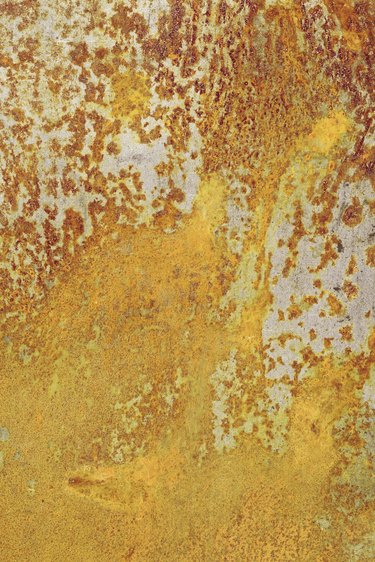Things You'll Need
Angle grinder with 80- and 120-grit discs
Drill with wire brush attachment
Sandpaper, medium and fine grits
Gloves
Goggles
Dust mask
Cloth
Rust inhibitor
Metal primer

Pitted metal is caused by rust eating down below the surface of the metal. It causes an uneven surface that must be smoothed out before it can be used or painted. It's vital to remove all the rust when working with the metal or the problem will simply return. Once the metal is smooth, it needs to be protected to prevent further oxidization.
Angle Grinder
Step 1
Attach the 80-grit disc to the angle grinder according to the instructions that come with the tool. Wear safety goggles, a dust mask and gloves for protection and to avoid inhaling metal dust.
Video of the Day
Step 2
Grind lightly over the pitted area of the metal; be careful not to push down too hard. Remove the worst of the rust from the affected area, then wipe with a cloth to judge your progress before attacking the deep pitting in the metal.
Step 3
Continue until you've cleared the area of rust, then switch to a 120-grit disc. Grind lightly across the area and around the edges; this will help smooth out much of the pitting and scratches. Grind lightly around the edge of the affected area, although don't extend too far out onto the rest of the metal.
Drill and Wire Brush
Step 1
Attach the wire brush to the drill and apply to the metal. Work on the worst-affected areas first, removing as much of the rust and flaking metal as possible. Work outward and then return as you remove the pitting from the metal.
Step 2
Work the wire brush deep into the pitted areas to clean out the rust, being sure to dig it all out.
Step 3
Press the wire brush lightly to remove the lighter rust around the pitted area, moving the wheel out so it just edges into the areas that don't have pitting. Wipe the metal clean with a cloth and examine to ensure no rust remains on the metal.
Sanding
Step 1
Attach medium-grit sandpaper to a sanding block and the sand the metal you've just cleared of rust. Move the block in circles over the entire area to smooth any ruts and ridges. Wipe the area clean with a cloth and use your fingertips to test for smoothness.
Step 2
Insert fine-grit sandpaper into the sanding block and repeat the sanding, continuing to go over the metal in circles. Press down lightly and keep sanding until the metal is smooth -- continually stopping and testing with your fingertips until you're satisfied.
Step 3
Wipe the area clean with a cloth. Paint on a rust inhibitor to protect the surface from future rusting or apply a rust-inhibiting metal primer.
Video of the Day